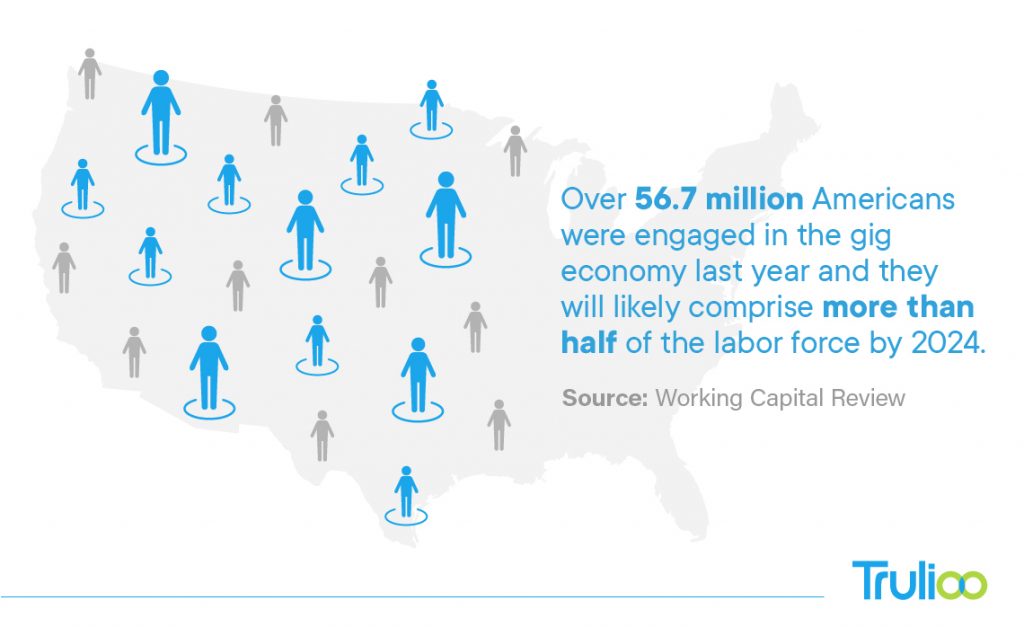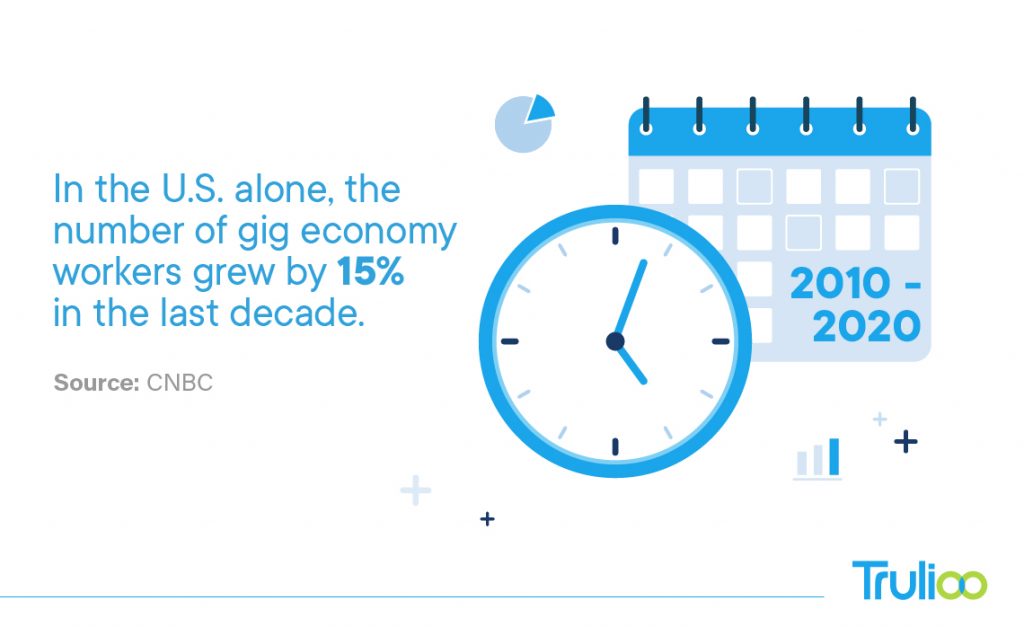Podcast: Play in new window | Download
Small and medium-sized enterprises (SMEs) and the gig economy are both growing rapidly. The gig economy offers contract workers flexibility and opportunities to generate income in difficult times, such as the ongoing COVID-19 crisis that has left millions unemployed. As these sectors of the economy continue expanding, payment companies and marketplace platforms need to be able to verify users and merchants/contractors to protect against bad actors and ensure trust and safety.
To learn more about why now is the time for payment companies to become involved in the gig economy and the unique identity verification needs of small and contract businesses, PaymentsJournal sat down with Zac Cohen, COO at Trulioo, and Tim Sloane, VP of Payments Innovation at Mercator Advisory Group.
The SME marketplace and gig economy are expanding
The world is in a digital age, making now an easier time to start a business than ever before. Consequently, small and medium enterprises are experiencing explosive growth. According to data from Trulioo:
Much of this growth comes from the fact that we’re in the digital age, making it easier than ever to start a business. For SMEs to continue to grow and thrive, they need access to the same tools, technologies, and capabilities as their large enterprise counterparts—but this isn’t always the case. Consequently, there is room for improvement in terms of how payments companies are supporting small business growth.

Then there’s the gig economy, which is similarly expanding. The number of gig economy workers in the U.S. has grown 15% in the last decade. In 2019, over 56.7 million Americans engaged in the gig economy, and this number is only expected to grow; gig workers are anticipated to comprise more than half of the labor force by 2024.


“The beauty of the gig economy is its flexibility and its ability to provide opportunity even in difficult times” such as the ongoing COVID-19 pandemic, said Cohen. Contract workers having the option to choose their own service provision in real time is critical to the structure of the gig economy.
On that note, it makes sense for companies to compensate gig workers in real time. After all, the spirit of the gig economy model is instant, on-demand, and flexible in times of need. Rather than withholding payments until a specific date, payment companies need to “replicate that instantaneous interaction and transactions; to do so and make the gig economy grow, verification is a key part of that process,” explained Cohen.
SMEs and the gig economy share an underlying challenge: Identity verification
Verification is a key part of serving SMEs and the gig economy, but quickly and effectively verifying the legitimacy of small merchants and contractors remains a key challenge. Having to navigate new business models presented by the gig economy does not negate compliance obligations or risks related to fraud. It does, however, require a different approach to identity verification, as there are different types of businesses that need to be accommodated.
Identity verification becomes even more complicated when it comes to small merchants and contractors that aren’t registered or incorporated. Gig economy workers who onboard as merchants sometimes don’t have a business registration number, making it challenging to verify them as a business entity.
“When you attempt to apply the same business or compliance logic on a completely new or different use case, yet expect the same high quality result, it just breaks down,” noted Cohen. For example, companies with individual merchants and freelancers from dozens of countries need to evaluate their technology toolkit to avoid having an ineffective traditional verification process or a costly, inefficient internal process.
What SMEs should look for when choosing an identity verification technology partner
The gig economy business model requires a new approach to identity verification. A holistic approach to identity verification makes it easier to verify sole proprietorships, freelancers, and micro-merchants by combining Know your Business (KYB) and Know Your Customer (KYC) processes. But even a holistic approach requires a corresponding map, or stack of technology, that easily applies the right tool for the right scenario at the right time.
According to Sloane, there are three critical determining factors in an effective identity verification solution:
- It has the capability of identifying down market individuals and entities outside of large corporations with annual reports.
- The information collected to identify users is significant and capable of meeting the obligations of countries being operating in.
- The solution is packaged in a way and at a price level that meets the needs of small business and enterprises.
“Those are three amazing and important parameters that need to go into the decision about who to partner with from a technology perspective,” agreed Cohen. By having a technology partner that satisfies these needs, SMEs can focus their time on the business itself, instead of facilitating and optimizing the complex customer onboarding and identification process.
Conclusion
The rise of the gig economy and SMEs mean that a one-size-fits-all approach to identity verification, fraud risk, and compliance is no longer a cost efficient or effective solution. Rather, the unique needs of these types of businesses make it crucial for them to partner with a technology provider that offers a holistic approach to identity verification and onboarding. By doing so, companies can focus on other aspects of business while protecting against fraudsters and bad actors.













